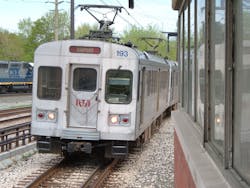Politics have led to an early logjam in a federal certification program meant to streamline safety and tied to transportation funding.
But the Federal Transportation Authority and a handful of state departments of transportation remain optimistic they’ll get the legislative and internal standards in order and approved by an April 2019 deadline.
As of the most recent FTA updates, only Ohio and its rail lines in Cleveland and Cincinnati have met the full requirements under the State Safety Oversight (SSO) Program. Thirty U.S. states (including Puerto Rico) with rail transit systems are required to meet FTA approval — with submissions recommended by this time next year to reach the deadline – or risk having all federal transit funds withheld.
The glaring hang-up in the process has been a requirement by seven of the states to have legislative approval on the federal measure and state agency safety protocols. That has left Illinois, Michigan, Puerto Rico, New York, New Jersey, Oklahoma and Tennessee looking to their state houses for a vote attached to millions in federal funding.
“Arguably the most important component of certification is legislation and it’s the one over which we have the least amount of control,” said Jim Hickey, Illinois DOT SSO program manager.
Hickey said he and his team have made great strides in the past 15 months on implementing measures in the standard and accomplishing tricky bureaucratic work like defining funding and taxing differences in its two rail systems. However, it could be easy to worry about Illinois’ state legislature, which has been racked with political strife and delayed budgets. On paper, Hickey said it may look like they are “stuck” in the initial phases of the certification, though he remains “confident” that they’ll get legislation passed in time.
In Michigan, Daniel Harris, DOT SSO program manager, said the process so far required his team to re-write the safety standard for the state’s two Detroit rail lines, then develop a three-to-five year staffing and accomplishment plan. Now, his team, working with a legislative liaison and assistance from grant-backed consultants, awaits action by a transportation subcommittee that would bring a measure to Lansing.
As far as the benefits from the SSO program, Harris praised Michigan’s rail safety record, though said the nationwide communication with other DOTs has already provided insight.
“For us the system previously was working very well. It doesn’t mean we didn’t try to continuously get better, to benefit from other state’s best practices,” said Harris, whose state is in line to receive an estimated $142 million in federal transportation funds in 2019.
Of the other remaining states, nine have submitted an application – including legislative approvals, where necessary — and are presently working through questions and details with federal officials. There are 12 states that have submitted some requirements to the FTA but are not hamstrung by legislation.
Ohio, announced last month as the first certified state, had state legislative language in place since the mid-1990s related to safety oversight, which just had to be tweaked in recent years, according to Brian Kummerer, Ohio DOT SSO Program Manager. Substantial aspects of the project for Ohio involved the “big picture” learning curve on the SSO standards for its rail operators in Cleveland and Cincinnati as well as in-house moves like separating compliance and program departments.
“We just chiseled away at it, a little bit at a time,” said Kummerer, whose state is estimated to receive more than $190 million for federal transportation in 2019.
FTA has worked with the states since 2013 to ready for the certification process, with regular communication, workshops, a 51-page “toolkit” and $90 million in grants. Aside from measures to reduce paperwork on the states, there have been no changes to the FTA “final rule” of the program since it was put into place in 2012, according to an FTA spokesperson. The spokesperson added that there have been no directives to alter this certification since President Donald Trump took office in January.
Hickey called FTA “very supportive” toward meeting the certification — and its related $609 million in estimated 2019 federal transportation funds for Illinois.
“They want us to get certified as much as we ourselves want to get certified,” he said.
About the Author

Justin Kern
Justin Kern is a writer and nonprofit marketing manager who lives in Milwaukee with his wife and cats.
